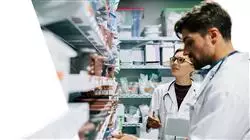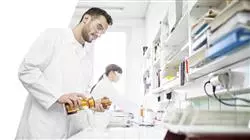University certificate
The world's largest faculty of pharmacy”
Introduction to the Program
Get updated on the advances in Pharmacology and Toxicology through this Postgraduate diploma in only 6 months”

Infectious diseases and intoxications are frequent in the hospital environment, for this reason the progress in the study of antibiotics, the management through the most effective pharmacological treatments has improved patient management. In this sense, the figure of the pharmacist is key when it comes to providing the most accurate pharmacology according to the characteristics of each clinical case.
In view of this reality, the constant evolution in the pharmacological field has led professionals to continuously update their skills. Thus, this Postgraduate diploma in Pharmacology and Toxicology was created by an excellent team of experts, brought together by TECH.
It is an intensive 6-month program that is distinguished by offering students advanced content on Pharmacology in the Central Nervous System, the Gastrointestinal System and diseases, infections and intoxications. All this, from a theoretical-practical approach that will be supported by clinical case studies, video summaries of each topic, videos in detail and essential readings.
Also, thanks to the Relearning method, based on the continuous reiteration of key content, the graduates will have the opportunity to keep abreast of developments in this field, without the need to invest long hours of study and memorization.
An ideal opportunity to study a quality program in a methodology that provides the flexibility required by students to reconcile their daily activities with an academic proposal that is at the forefront.
You will be up to date on the refinement of antibiotic use in patients with skin infections”
This Postgraduate diploma in Pharmacology and Toxicology contains the most complete and up-to-date scientific program on the market. The most important features include
- The development of practical cases presented by experts in Pharmacy, Hospital Management, among others
- Graphic, schematic, and practical contents with which they are created, provide scientific and practical information on the disciplines that are essential for professional practice
- Practical exercises where self-assessment can be used to improve learning
- Its special emphasis on innovative methodologies
- Theoretical lessons, questions to the expert, debate forums on controversial topics, and individual reflection assignments
- Content that is accessible from any fixed or portable device with an Internet connection
The specialized literature in this program will allow you to further extend the information on the Pharmacology of the Gastrointestinal System”
The program’s teaching staff includes professionals from sector who contribute their work experience to this educational program, as well as renowned specialists from leading societies and prestigious universities.
Its multimedia content, developed with the latest educational technology, will provide the professionals with situated and contextual learning, i.e., a simulated environment that will provide an immersive education programmed to learn in real situations.
The design of this program focuses on Problem-Based Learning, by means of which the professionals must try to solve the different professional practice situations that are presented throughout the academic course. For this purpose, the students will be assisted by an innovative interactive video system created by renowned experts.
Thanks to this qualification you will be up to date with the pharmacology used to treat substance abuse disorders"

Update yourself at your own pace and from the comfort of your home with TECH's 100% online methodology"
Why study at TECH?
TECH is the world’s largest online university. With an impressive catalog of more than 14,000 university programs available in 11 languages, it is positioned as a leader in employability, with a 99% job placement rate. In addition, it relies on an enormous faculty of more than 6,000 professors of the highest international renown.

Study at the world's largest online university and guarantee your professional success. The future starts at TECH”
The world’s best online university according to FORBES
The prestigious Forbes magazine, specialized in business and finance, has highlighted TECH as “the world's best online university” This is what they have recently stated in an article in their digital edition in which they echo the success story of this institution, “thanks to the academic offer it provides, the selection of its teaching staff, and an innovative learning method aimed at educating the professionals of the future”
A revolutionary study method, a cutting-edge faculty and a practical focus: the key to TECH's success.
The most complete study plans on the university scene
TECH offers the most complete study plans on the university scene, with syllabuses that cover fundamental concepts and, at the same time, the main scientific advances in their specific scientific areas. In addition, these programs are continuously being updated to guarantee students the academic vanguard and the most in-demand professional skills. In this way, the university's qualifications provide its graduates with a significant advantage to propel their careers to success.
TECH offers the most comprehensive and intensive study plans on the current university scene.
A world-class teaching staff
TECH's teaching staff is made up of more than 6,000 professors with the highest international recognition. Professors, researchers and top executives of multinational companies, including Isaiah Covington, performance coach of the Boston Celtics; Magda Romanska, principal investigator at Harvard MetaLAB; Ignacio Wistumba, chairman of the department of translational molecular pathology at MD Anderson Cancer Center; and D.W. Pine, creative director of TIME magazine, among others.
Internationally renowned experts, specialized in different branches of Health, Technology, Communication and Business, form part of the TECH faculty.
A unique learning method
TECH is the first university to use Relearning in all its programs. It is the best online learning methodology, accredited with international teaching quality certifications, provided by prestigious educational agencies. In addition, this disruptive educational model is complemented with the “Case Method”, thereby setting up a unique online teaching strategy. Innovative teaching resources are also implemented, including detailed videos, infographics and interactive summaries.
TECH combines Relearning and the Case Method in all its university programs to guarantee excellent theoretical and practical learning, studying whenever and wherever you want.
The world's largest online university
TECH is the world’s largest online university. We are the largest educational institution, with the best and widest online educational catalog, one hundred percent online and covering the vast majority of areas of knowledge. We offer a large selection of our own degrees and accredited online undergraduate and postgraduate degrees. In total, more than 14,000 university degrees, in eleven different languages, make us the largest educational largest in the world.
TECH has the world's most extensive catalog of academic and official programs, available in more than 11 languages.
Google Premier Partner
The American technology giant has awarded TECH the Google Google Premier Partner badge. This award, which is only available to 3% of the world's companies, highlights the efficient, flexible and tailored experience that this university provides to students. The recognition as a Google Premier Partner not only accredits the maximum rigor, performance and investment in TECH's digital infrastructures, but also places this university as one of the world's leading technology companies.
Google has positioned TECH in the top 3% of the world's most important technology companies by awarding it its Google Premier Partner badge.
The official online university of the NBA
TECH is the official online university of the NBA. Thanks to our agreement with the biggest league in basketball, we offer our students exclusive university programs, as well as a wide variety of educational resources focused on the business of the league and other areas of the sports industry. Each program is made up of a uniquely designed syllabus and features exceptional guest hosts: professionals with a distinguished sports background who will offer their expertise on the most relevant topics.
TECH has been selected by the NBA, the world's top basketball league, as its official online university.
The top-rated university by its students
Students have positioned TECH as the world's top-rated university on the main review websites, with a highest rating of 4.9 out of 5, obtained from more than 1,000 reviews. These results consolidate TECH as the benchmark university institution at an international level, reflecting the excellence and positive impact of its educational model.” reflecting the excellence and positive impact of its educational model.”
TECH is the world’s top-rated university by its students.
Leaders in employability
TECH has managed to become the leading university in employability. 99% of its students obtain jobs in the academic field they have studied, within one year of completing any of the university's programs. A similar number achieve immediate career enhancement. All this thanks to a study methodology that bases its effectiveness on the acquisition of practical skills, which are absolutely necessary for professional development.
99% of TECH graduates find a job within a year of completing their studies.
Postgraduate Diploma in Pharmacological Toxicology
Would you like to immerse yourself in the fascinating world of toxicology to learn how to evaluate and understand the harmful effects of drugs and chemicals on human health? TECH Global University has the ideal program for you. The Postgraduate Diploma in Pharmacological Toxicology is a Postgraduate Diploma taught in 100% online mode, which will help you fulfill that purpose. This program was designed under the highest quality standards, which guarantees that you will obtain an immersive preparation that will elevate your learning curve. Our educational model includes innovative lessons guided by experts, who will contribute their best knowledge and skills. From this, you will explore the fundamentals of pharmacology and toxicology, analyzing how drugs and chemicals interact with biological systems. With the support of experts in the field, you'll examine the different mechanisms of toxicity and the factors that can influence the body's responses.
Become a specialist in the field.
Be a specialist in pharmacological toxicology
The team of highly qualified professors will provide you with comprehensive and up-to-date training, combining theory and practice in an academic environment of excellence. As you progress through the curriculum, you will develop analytical skills to identify and assess toxicological risks in the pharmaceutical, cosmetic and agri-food industries. You will learn to use advanced technologies to perform toxicity testing and interpret the results accurately and meaningfully. The program will also address emerging topics in toxicology, including computational toxicology and safety assessment of nanomaterials and biotechnology products. In addition, you will analyze current challenges related to regulation and legislation in the use of chemicals and drugs. Upon completion of the Postgraduate Diploma, you will be prepared to meet the complex challenges of pharmacological toxicology and contribute to the well-being and safety of society.







